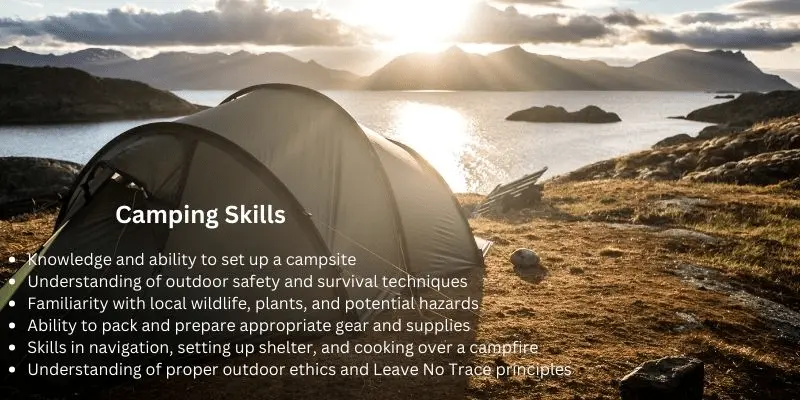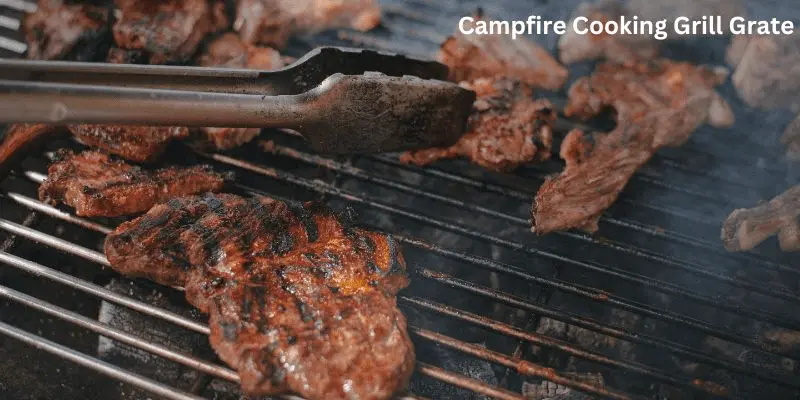Exploring 10 Basic Camping Skills: Your Key to Outdoor Adventures
Updated: 17 Jan 2024
368
Welcome to the “Basic Camping Skills” segment, wherein we preserve things simple in your out of doors adventures! Here, you’ll find easy-to-follow tips on building a campfire, setting up your tent like a pro, and mastering essential knots. Whether you’re new to camping or simply want a short refresher, our truthful guidance is right here to make your tenting experience a breeze.
From the fundamentals of staying warm by the hearth to ensuring your safe haven is cushy, we’ve were given you covered. Let’s make tenting a laugh and stress-free with these essential capabilities. When it involves camping, a little bit of preparation is going a protracted way. Whether you’re making plans a weekend getaway or embarking on a backcountry adventure, having some simple tenting abilities will make your journey greater exciting and more secure.
Features of Basic Camping Skills
Some key features of initial camping expertise include:
- Knowledge and ability to set up a campsite, including pitching a tent and starting a fire
- Understanding of outdoor safety and survival techniques
- Familiarity with local wildlife, plants, and potential hazards
- Ability to pack and prepare appropriate gear and supplies for different camping scenarios
- Skills in navigation, setting up shelter, and cooking over a campfire
- Understanding of proper outdoor ethics and Leave No Trace principles
Overall, basic camping skills allow individuals to comfortably and confidently explore the outdoors while respecting the environment and ensuring their safety.

Setting Up Camp
The first skill you’ll need as a camper is knowing how to set up camp. This includes finding an appropriate location, setting up your tent, and creating a fire pit.
1. Finding an appropriate location
When choosing a campsite, make sure it is on level ground and not too close to water sources or potential hazards like dead trees. Look for natural wind barriers such as boulders or dense vegetation to protect your tent from windy conditions.
2. Setting up your tent
Once you’ve found a suitable location, it’s time to set up your tent. Lay down a groundsheet or tarp to protect the bottom of your tent from moisture and sharp objects. Then, follow the instructions included with your tent to assemble it.
3. Creating a fire pit
Building a proper fire pit is essential for cooking food and staying warm during chilly nights. Choose an open area away from your tent and any flammable materials. Dig a pit about 1 foot deep and surround it with rocks or stones for safety.
Essential Camping Skills
Explore essential skills for a successful camping adventure, from fire building to wildlife awareness.
| Camping Skill | Description | |
| 1 | Fire Building | Techniques for starting and maintaining a campfire, including using tinder, kindling, and firewood. |
| 2 | Tent Pitching | Proper setup of a tent, including choosing a suitable location, assembling poles, and securing guy lines. |
| 3 | Campsite Selection | Identifying suitable camping spots based on factors such as terrain, proximity to water sources, and safety concerns. |
| 4 | Knot Tying | Learning essential knots for securing tarps, tying down gear, and creating makeshift repairs. |
| 5 | Cooking Over Fire | Preparing meals using campfire cooking methods such as grilling, skewering, and Dutch oven cooking. |
| 6 | Map Reading | Understanding topographic maps, orienting oneself using a compass, and navigating trails and terrain. |
| 7 | Water Purification | Techniques for filtering and purifying water from natural sources to ensure safe drinking during camping trips. |
| 8 | Wildlife Awareness | Knowledge of local wildlife, including how to store food securely, avoid confrontations, and respect natural habitats. |
| 9 | Leave No Trace | Principles for minimizing environmental impact, including packing out trash, respecting wildlife, and staying on trails. |
| 10 | First Aid | Basic first aid skills for treating common camping injuries such as cuts, burns, insect bites, and sprains |
This table provides a concise overview of each skill.
Campfire Cooking
No camping trip is complete without some delicious camping meals. Here are a few tips for cooking over an open fire:
1. Use a tripod or grill grate
These tools make it easier to cook over the fire and prevent food from falling into the flames.

2. Bring the right cookware
Make sure you have proper cooking equipment when camping. Here are four essential camping cookware and utensils you need: a sturdy pot or pan, a portable oven or pan, cooking utensils like spatulas and tongs, and carrying plates or bowls will serve you delicious camp food.
With these ingredients in hand, you’ll be ready to whip up delicious outdoor cuisine wherever your travels take you. Pack lightweight but sturdy pots and pans that can withstand high heat. Cast iron is a popular choice for campfire cooking
3. Choose appropriate ingredients
Stick to simple recipes with foods that are easy to cook over a fire, such as hot dogs, burgers, and foil-wrapped veggies.
Staying Safe in the Outdoors
While camping can be a fun and relaxing experience, it’s important to always prioritize safety. When camping in the United States, it’s essential to prioritize staying safe in the outdoors. Remember to always follow campground rules and regulations, stay aware of your surroundings, and be prepared for any unexpected situations.
Here are some key tips to keep in mind:
- Know how to handle wildlife encounters: Educate yourself on the local wildlife and what to do if you encounter animals such as bears or snakes. Keep your campsite clean and store food properly to avoid attracting animals.
- Always have a first aid kit: Accidents happen, so make sure to pack a first aid kit and know how to use it. It should include essentials like bandages, gauze, antiseptic wipes, and any necessary medications
- Follow Leave No Trace principles: Respect the environment and leave your campsite as you found it. This includes properly disposing of waste, avoiding damaging plants and trees, and not disturbing wildlife. When camping in Oregon, it’s important to follow Leave No Trace principles. This means taking care to leave the environment as you found it, minimizing your impact on nature.
Additional Tips and Resources
There are given some extra tips and resources for you to keep in mind the following.
- Always check the weather forecast before your trip and pack accordingly
- Bring a map and compass, or a GPS device, in case you get lost
- Practice setting up your tent at home before heading out on a trip
- Make sure to properly extinguish your campfire before leaving the campsite
- Research and follow any local camping regulations or restrictions
- Consider taking a wilderness first aid course for more advanced safety skills
- Don’t forget to bring plenty of water and stay hydrated while camping
- Bring insect repellent and learn how to identify poisonous plants to avoid any unpleasant encounters
- Check out online forums or ask experienced campers for tips and advice. Keep exploring and stay safe
There are endless possibilities when it comes to camping, so don’t be afraid to try new things and continuously improve your skills. Check out camping blogs, and YouTube channels, or join a local outdoor group to discover more tips and tricks for successful camping trips.
Remember to always prioritize safety, respect the environment, and have fun!
There are also many books and online resources available for those looking to deepen their knowledge of camping skills, survival techniques, and outdoor safety. Consider investing in quality gear that will last you through years of adventures. And most importantly, don’t forget to have fun and create unforgettable memories while camping.
Pros and Cons of Basics Camping Skills
Camping can be a great way to connect with nature and create lasting memories, but it also comes with its own set of pros and cons. Let’s take a look at some of the potential benefits and drawbacks of primary camping skills:
| Pros |
|---|
|
| Cons |
|---|
|
FAQs
What is camping?
Camping is the activity of temporarily staying outdoors, typically in a tent or camper, for recreational purposes.
Why is camping popular?
Camping has become increasingly popular as it allows individuals to disconnect from technology and reconnect with nature, providing opportunities for relaxation, adventure, and bonding with others.
What are some essential items to bring while camping?
Some essential items to bring while camping include a tent, sleeping bag and pad, water and food, appropriate clothing, a first aid kit, and any necessary cooking equipment. It is also important to bring appropriate gear for the specific environment and activities planned.
How can I stay safe while camping?
Staying safe while camping involves proper planning and preparation, understanding and following outdoor safety guidelines, and being aware of potential hazards in the environment. It is also important to always have a means of communication and to inform others of your camping plans and location.
Can anyone go camping?
While camping can be enjoyed by people of all ages and abilities, individuals with certain health conditions or physical limitations need to consult with a doctor and ensure they are properly prepared for camping activities.
Conclusion
Learning some basic camping skills is like getting a key to unlock amazing adventures in nature! These skills will help you have fun and stay safe on your camping trips. You’ll learn how to set up your tent, build a fire for cooking, and make yummy meals outdoors. But most importantly, you’ll also learn how to stay safe around wildlife, what to pack in a first-aid kit, and how to leave the campsite as clean as you found it.
Please Write Your Comments